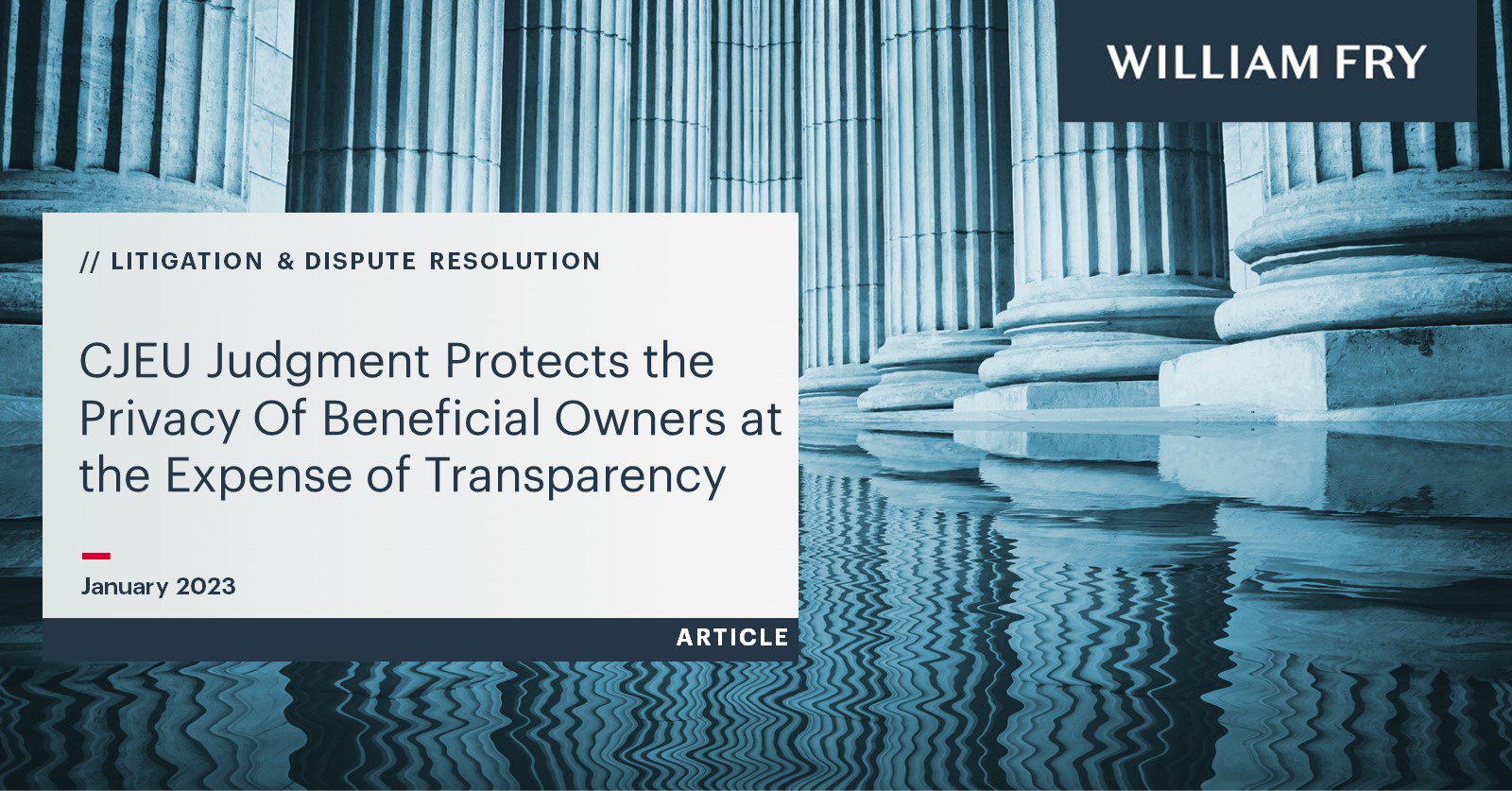On 22 November 2022, the Court of Justice of the European Union (CJEU) published its decision in WM and Sovim SA v Luxembourg Business Registers (joined Cases C‑37/20 and C‑601/20) (Decision), which affects European Union Member States’ national beneficial ownership registers.
The CJEU found a provision under the Fourth Anti-Money Laundering Directive (AMLD4), amended by the Fifth Anti-Money Laundering Directive (AMLD5), invalid. The Decision initially led to the suspension of access to several EU national registers, including the Central Register of Beneficial Ownership of Companies and Industrial and Provident Societies (RBO), which is operated in Ireland by the Companies Registration Office (CRO). The Decision and its impact on (re)insurers was reviewed by our Insurance Department colleagues here.
The Decision
Under AMLD4, member states were required to implement domestic legislation requiring entities to hold information on their beneficial owner(s) and establish a central register, with this information accessible to anyone with a legitimate interest in knowing the information. The rules around access were extended by AMLD5, which allowed any member of the public to access the information. A court in Luxembourg considered that disclosing such information carried a disproportionate risk of interference with the fundamental rights of the beneficial owners concerned. Therefore, questions around certain provisions of AMLD5’s validity were referred to the CJEU for preliminary ruling. The CJEU held that the increased access provided by AMLD5 was invalid.
The CJEU found that permitting public access to registers of this nature constituted a breach of Articles 7 and 8 of the Charter of Fundamental Rights of the European Union. It held that access to such information constituted a serious interference with the fundamental rights to respect for private life and the protection of personal data.
Impact of the Decision
The CRO has limited access to the RBO to Designated Persons and Competent Authorities. This includes authorised officials from the Central Bank of Ireland, the Law Society of Ireland, Revenue, An Garda Síochána and other state bodies. The public is only entitled to view entities’ profiles and the number of beneficial owners filed for that entity. Some legal practitioners have questioned what this means for transparency.
Public registers hold important information about beneficial owners such as their names, dates of birth, countries of residence, and the size of their interest in the company. In fraud investigations, this information may assist in gathering evidence regarding the location of stolen assets. While law enforcement agencies will still have access to this information for the purpose of investigating criminal activity, the Decision may cause issues in civil fraud cases. It remains to be seen whether the Decision will have the effect of restricting access for forensic investigators or lawyers to information for the purposes of conducting investigations into civil fraud.
However, all is not lost, there are other litigation and investigation tools available for entities or individuals potentially affected by civil fraud where there is a necessity to identify an underlying beneficial owner. For instance, Norwich Pharmacal Orders (NPO) can be a powerful investigation tool where it is not possible to identify a wrongdoer. In such circumstance, proceedings are initiated against a third party for the sole purpose of obtaining an order identifying the unknown wrongdoer. An NPO can direct the third party to disclose information, including about the wrongdoer’s identity, to the applicant. You can read our coverage on the growth of NPO’s as a litigation tool here and here.
Conclusion
While the public benefits from a greater level of transparency, it is understandable why high-net-worth individuals, in particular, may be uncomfortable with rights of access to information in beneficial ownership registers. Although the information is a useful aid in fraud investigations, it is arguable that unrestricted access to such information could be used to perpetrate fraud. It will be interesting to see how any new legislation balances the right to privacy against the need for transparency. For now, it is at the discretion of the Member States to ensure they are acting in line with the Decision.
For further information, please contact Paul Convery, Sarah Twohig or your usual William Fry contact.
Contributed by Jane Gallagher


